Peremptory Challenge of a Judge
If you have a case in superior court, and you believe you cannot get a fair and impartial hearing or trial from the judge, commissioner, or referee assigned to your case, California Code of Civil Procedure (CCP) § 170.6 gives you the right to disqualify him or her without having to show a reason. This is called a peremptory challenge.
Templates and Forms
- Motion for Peremptory Challenge to a Judge Template (DOCX)
- Declaration Supporting Motion for Peremptory Challenge Template (DOCX)
- Order for Transfer after Peremptory Challenge Template (DOCX)
- Proof of Service by Mail
What kinds of cases allow me to challenge the judge?
Challenges can be made at any trial, special proceeding, or hearing involving “a contested issue of law or fact.” Examples are a civil or criminal trial, law and motion proceedings, injunction hearings, and contested probate or family law proceedings.
When are challenges not allowed?
They cannot be used to disqualify judges at settlement conferences or case management conferences.
How many challenges am I allowed?
Each side gets to challenge a judge one time only. You have no control over the judge assigned to take over your case, so avoid hasty or ill-informed decisions to disqualify.
How do I let the court know I am challenging the judge?
The challenge is usually made by a written motion to the court in the proper format with specific language and supported by a declaration made under penalty of perjury. An oral motion under oath is also allowed.
The notice of motion to disqualify must be served on all other parties in a civil action no later than five days after it is made. (CCP § 170.6(a)(3))
When do I make the motion?
Your motion must be timely and it must be made before the hearing or trial. It may not be made after the hearing or trial commences. There are specific deadlines and strict time frames in which the challenge must be made, depending on your court’s calendaring system (see chart). Improper timing is the number one reason that challenges are rejected.
How long does it take to get a new judge after my challenge is filed?
It may be hours or days before a new judge can be assigned to your case after a CCP § 170.6 motion is filed.
Learn what you can about the judge in order to make the best decision.
Often you will know the name of the judge assigned to your case in advance. If you have never before been in front of this judge, take advantage of this notice. Make time to visit the judge’s courtroom to watch how he or she handles cases like yours. Knowing that you wish to disqualify a judge early in the process gives you time to prepare a proper written challenge. If you don’t know who the judge will be prior to your court date, you may make your challenge orally when your case is called.
What if I feel the judge is guilty of misconduct?
The State of California Commission on Judicial Performance reviews complaints charging judicial misconduct. This is not a substitute for the appellate process, or a tactic to use when one is unhappy with a judge’s ruling. Judicial misconduct is a separate matter, requiring a different procedure. Procedures and the form of complaint for judicial misconduct may be found at the Commission on Judicial Performance: “Filing a Complaint.”
Step-by-Step Instructions
1
Know Your Court’s Calendaring System
Sacramento County Superior Court
The Sacramento Superior Court uses a master calendar system to assign cases to judicial officers. This system does not assign a judicial officer at the time the complaint is filed. Instead, all cases proceed through the system and are assigned by terminal case digits to different departments for specific types of matters.
The court calendaring system under which your case is assigned depends on the county where the case is filed and the type of case. In some courts trial judges are not assigned at the time of filing, but at a later date.
2
Determine Your Deadline
Consult the chart below to determine the last day to file a peremptory challenge in your local superior court. If you are unsure about the type of calendaring system your court has, contact the court clerk for information.
The timing and deadlines for challenging the judge depend on your court’s local rules.
- Consult local rules or contact the court clerk to determine your court’s method of assigning cases to judges (master calendar, judge for all purposes, etc.).
- Identify the date of your trial or hearing.
- Use a calendar to determine your deadline for filing a challenge. From your trial or hearing date, count backwards the required number of days needed to challenge a judge. If the 10th day is a holiday or weekend, keep counting backwards until you reach a business day. This is the last day a party can file a timely peremptory challenge under CCP § 170.6.
| Type | Notice Required (CCP § 170.6) |
|---|---|
| Courts using Master Calendar System | Under this system, a challenge must be made at the time of the assignment when the case is set for immediate trial. However, if set by a Master Calendar for a later trial date, the 10 day/5day rule applies. |
| All-Purpose Judge | The challenge must be made within 15 days after notice of the all-purpose assignment, or, if the challenging party has not yet appeared, then within 15 days after the appearance. |
| Where Judge’s Identity Known Before Trial (10 day/5 day rule) | In this situation, if the identity of the judge is known at least 10 days prior to the date of the hearing or trial, the challenge must be made at least 5 days before the trial or hearing date. |
| Single-Judge Courts | In courts having only one judge, a challenge must be made before the expiration of 30 days after the date the moving party first appears in the action. |
3
Check Your Court’s Rules
Variations in procedure designed by your county court are generally minor, but you want to make sure you are in compliance. For instance, special courts, such as Dependency Court and Family Court, may have specific rules that limit or completely prohibit a peremptory challenge in certain types of proceedings. In Sacramento, check the Sacramento County Local Rules.
4
Draft Your Motion, Declaration, and Order
You may download customizable samples of a Motion for Peremptory Challenge, Declaration in Support of Peremptory Challenge, and Order of Transfer from the links at the top of this guide. You will need to modify the text to fit the specific facts of your case.
5
Make Copies
Make three copies of each of your documents. The original and one copy will be filed with the court. One copy will need to be served on the other party, and one copy should be kept for your records.
6
Have the Motion Served
The person who is serving your Motion for you must complete a proof of service form, typically, either a Proof of Personal Service form or a Proof of Service by First Class Mail form. For more information on these Proofs of Service, see the guides on our website personal service guide & service by mail guide.
7
Filing/Fees
Documents are filed with the clerk at the courthouse where the matter is being heard. For Civil cases, file your documents at the Gordon D. Schaber Courthouse at 720 Ninth Street downtown. For Family Law cases, file your documents on the first floor of the William R. Ridgeway Family Relations Courthouse located at 3341 Power Inn Rd.
Current fees are available on the Sacramento County Superior Court’s website. If you qualify for a fee waiver, you may file a request with the court. For more information, see our Step-by-Step guide on Fee Waivers.
For More Information
At the Law Library:
California Forms of Pleading and Practice
KFC 1010 .A65 C3 (Ready Reference)
Vol. 27, Chapter 317, Judges.
Electronic Access: On the Law Library’s computers, using using Lexis Advance.
California Practice Guide: Civil Trials and Evidence
KFC 1025 .A9 W44
Vol. 1, Chapter 3, Challenging the Judge.
California Trial Practice: Civil Procedure During Trial
KFC 1025 .A16 F74
Vol. 1, Chapter 6, Court Conferences and Selected Pretrial Motions
Electronic access: On the Law Library’s computers, using OnLaw.
Samples
Motion for Peremptory Challenge
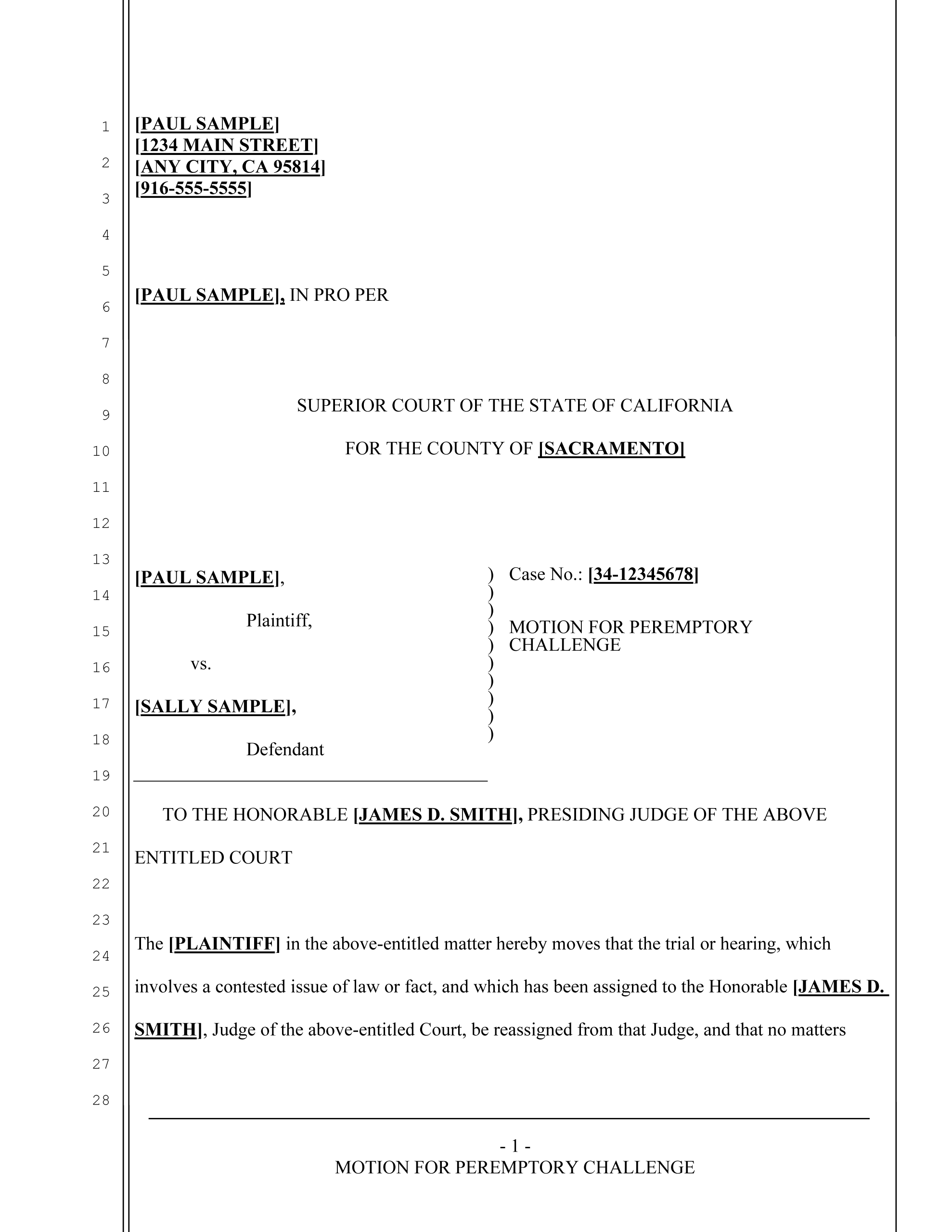
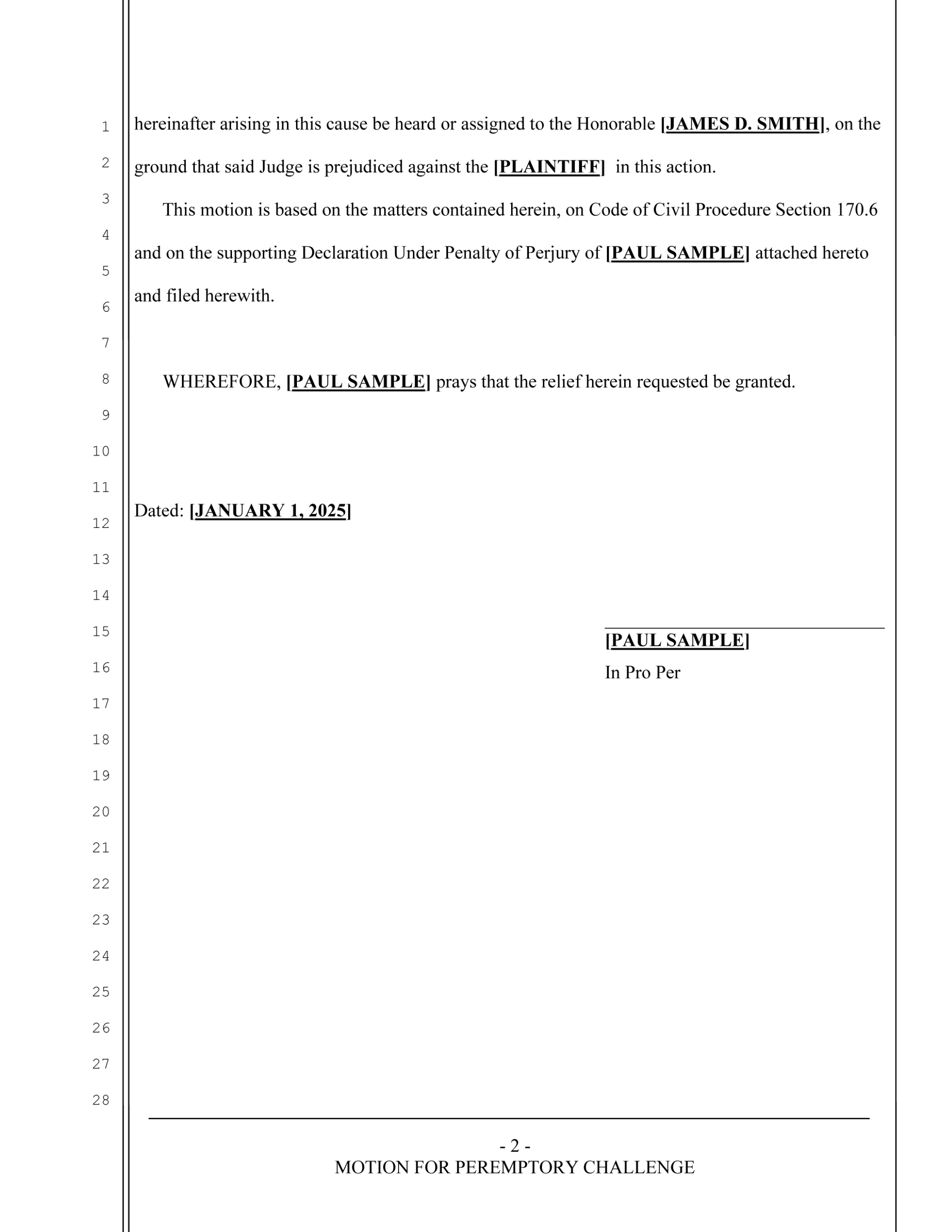
Declaration in Support of Peremptory Challenge
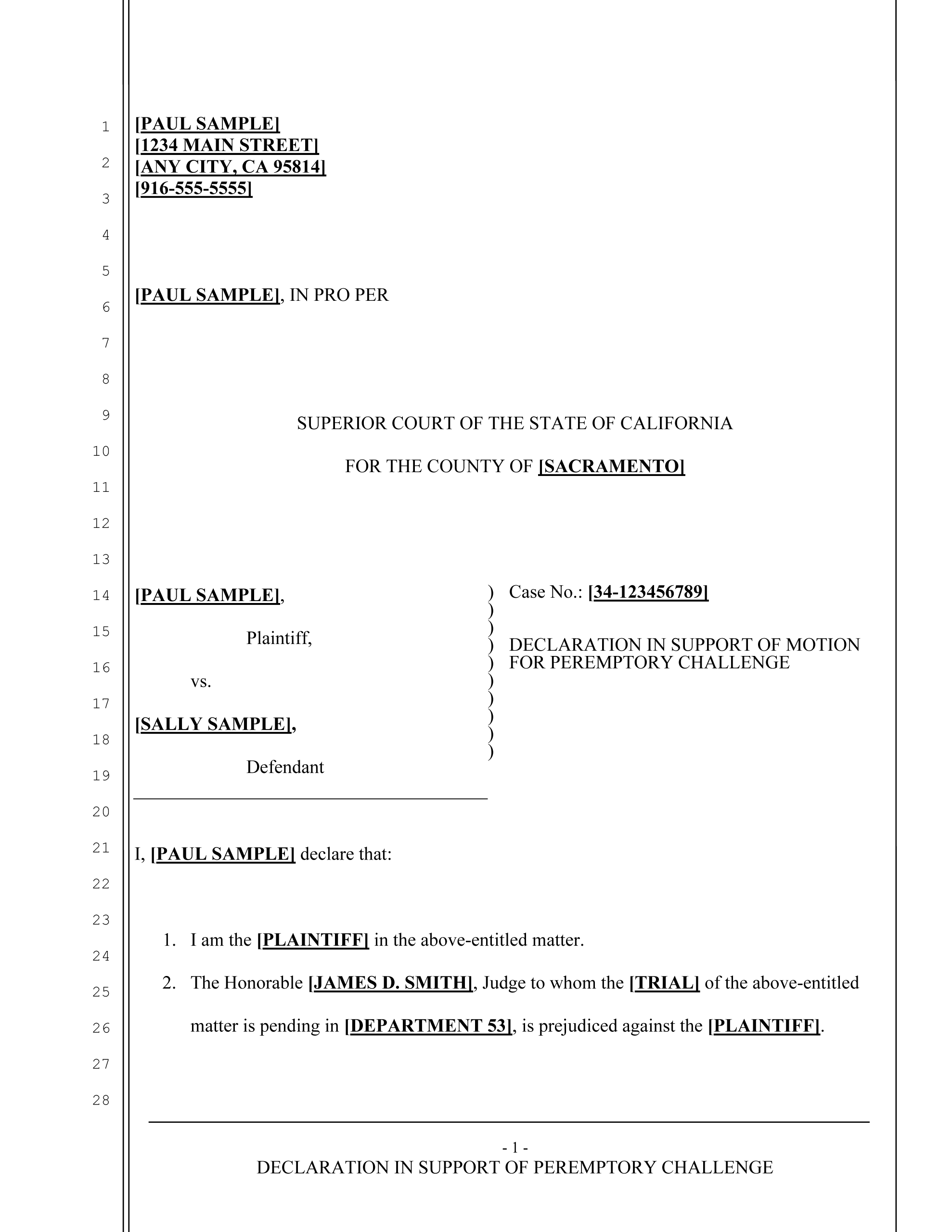
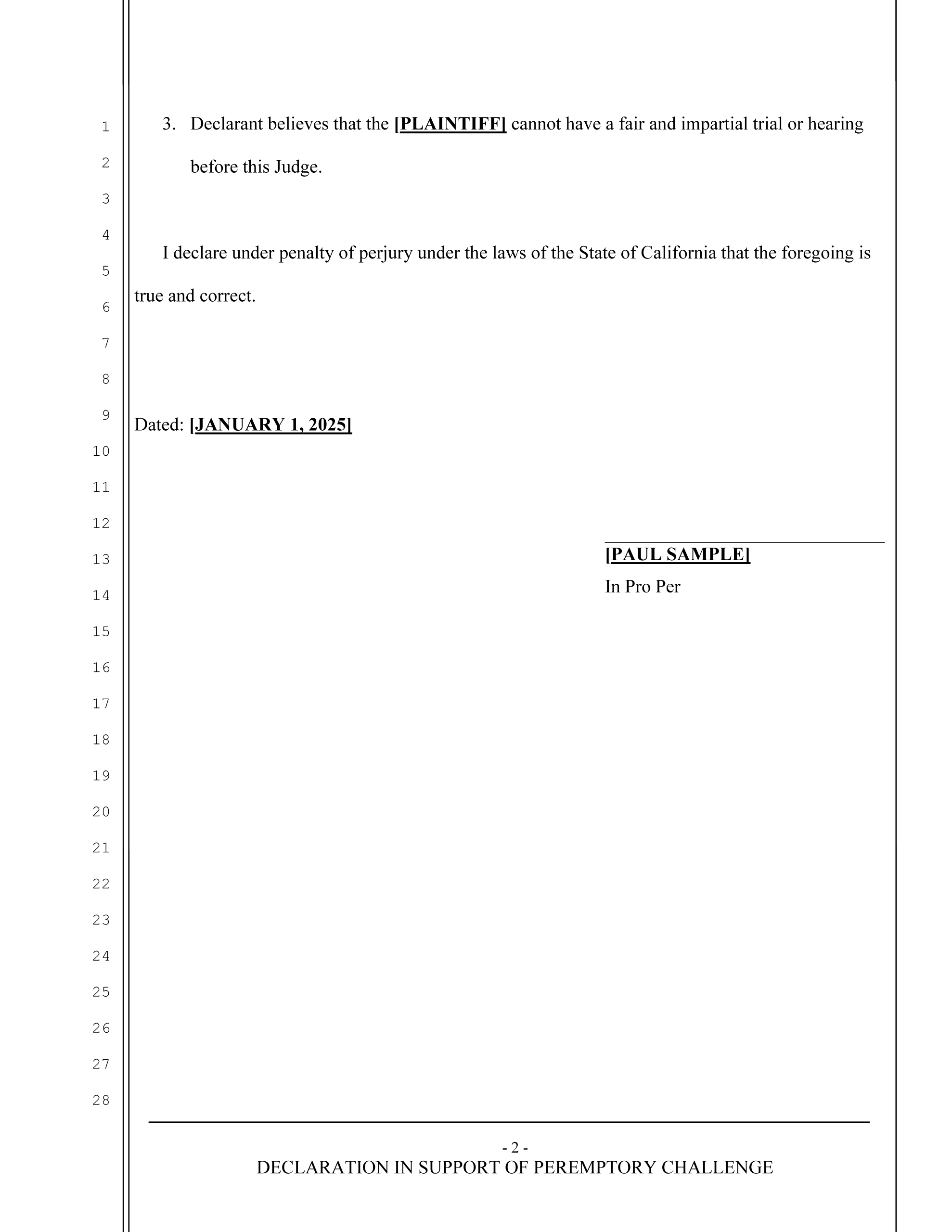
Proposed Transfer Order
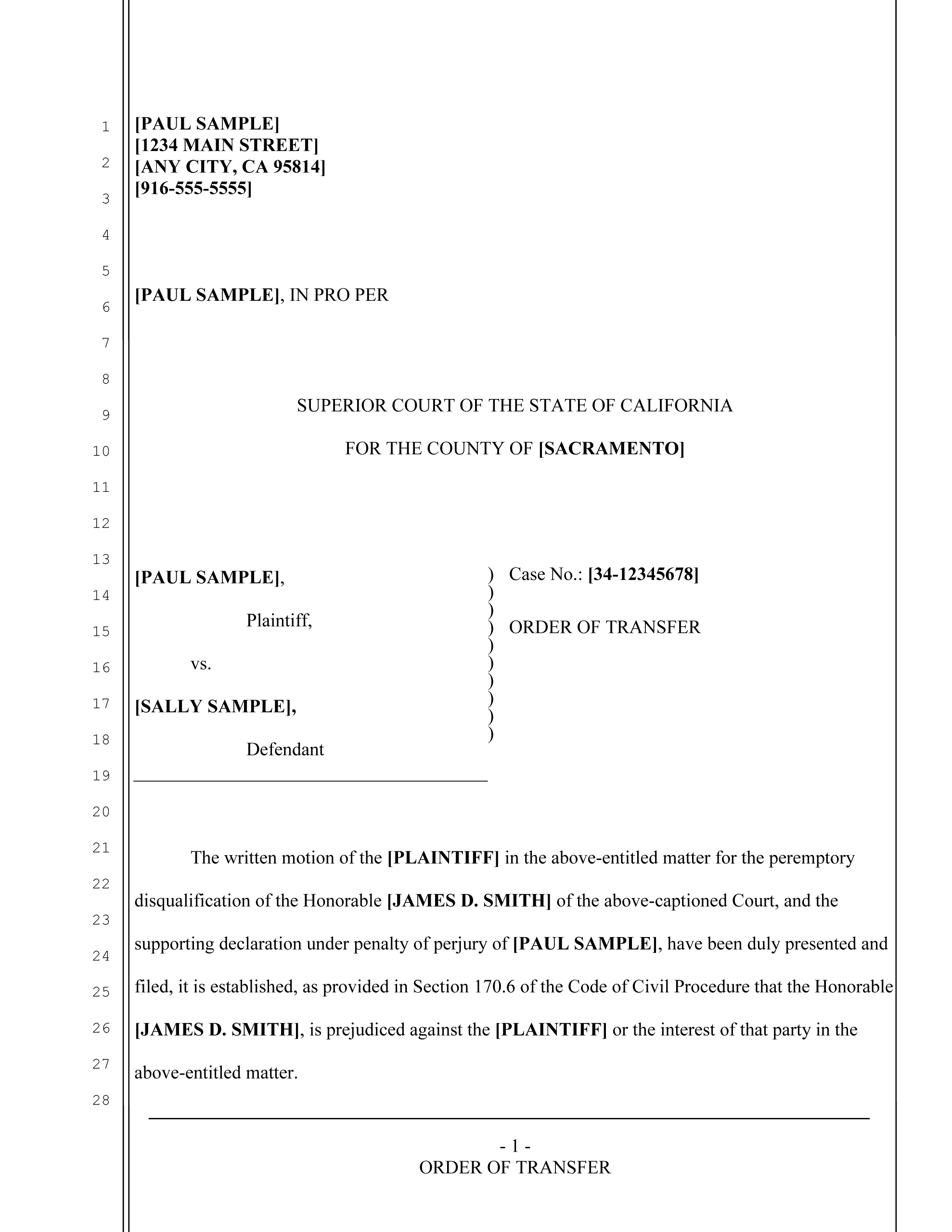
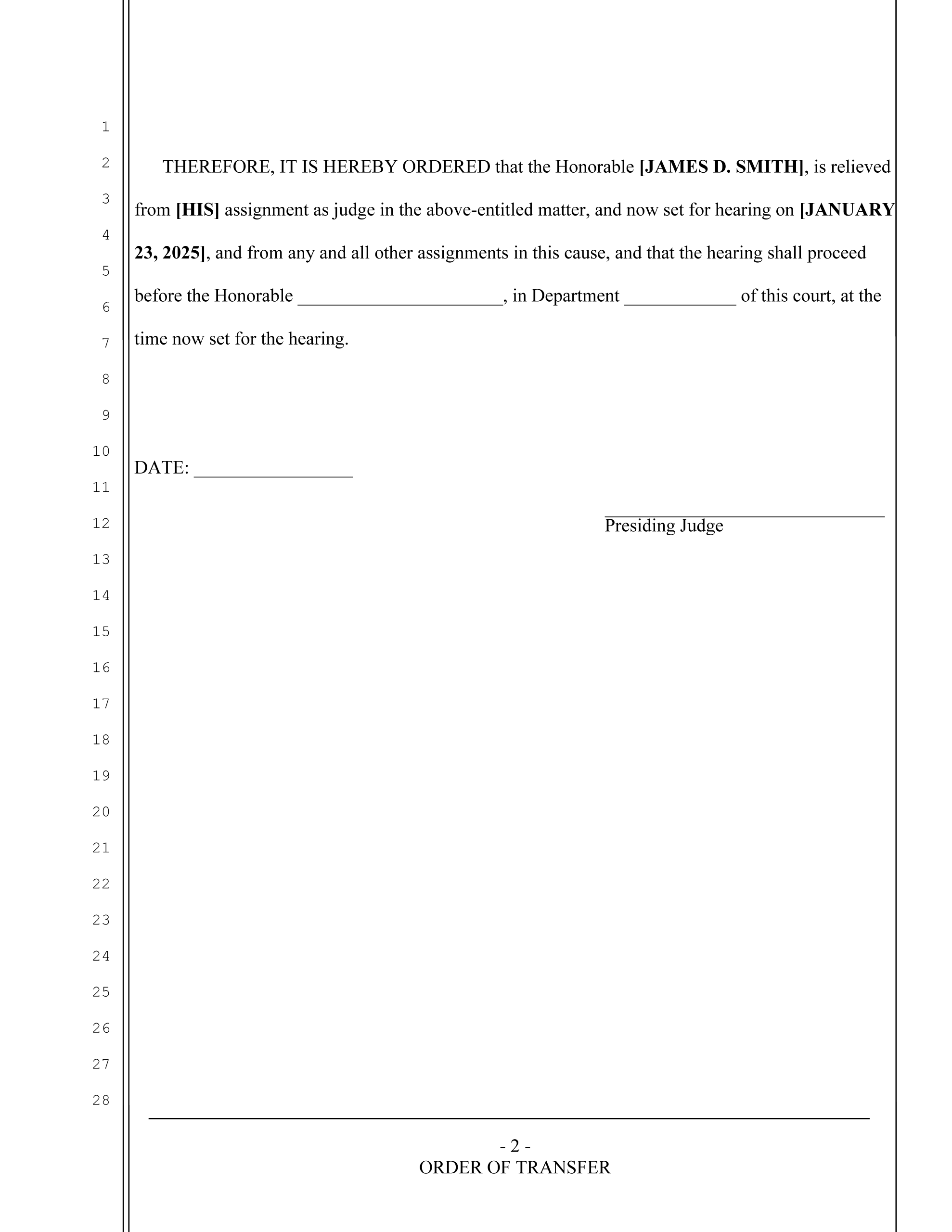
This material is intended as general information only. Your case may have factors requiring different procedures or forms. The information and instructions are provided for use in the Sacramento County Superior Court. Please keep in mind that each court may have different requirements. If you need further assistance consult a lawyer.




